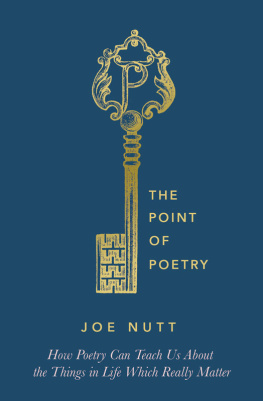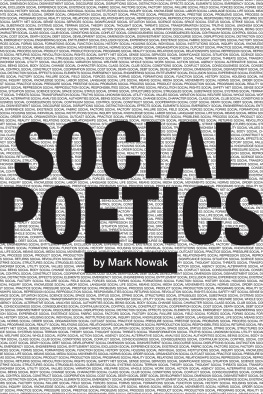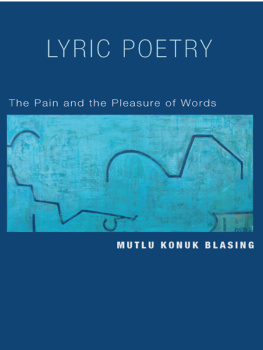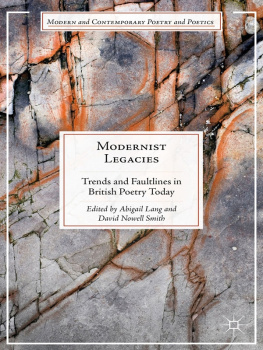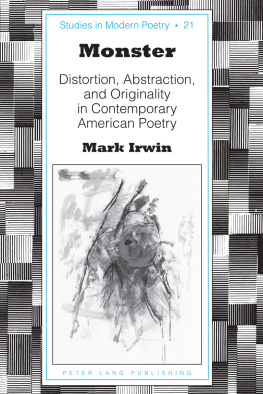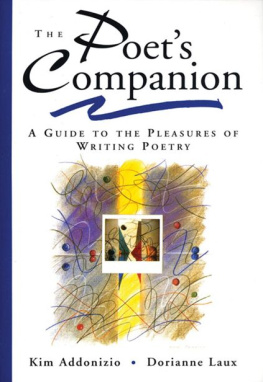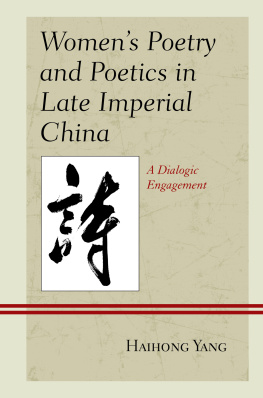Lyric Pedagogy and Marxist-Feminism
Bloomsbury Studies in Critical Poetics
Series Editor
Daniel Katz, University of Warwick, UK
Political, social, erotic and aestheticpoetry has been a challenge to many of the dominant discourses of our age across the globe. Bloomsbury Studies in Critical Poetics publishes books on modern and contemporary poetry and poetics that explore the intersection of poetry with philosophy, linguistics, psychoanalysis, political and economic theory, protest and liberation movements as well as other art forms, including prose. With a primary focus on texts written in English but including work from other languages, the series brings together leading and rising scholars from a diverse range of fields for whom poetry has become a vital element of their research.
Editorial Board:
Hlne Aji, University of Paris Ouest-Nanterre, France
Vincent Broqua, University of Paris 8Vincennes/Saint Denis, France
Olivier Brossard, University of Paris Est Marne La Valle, France
Daniel Kane, University of Sussex, UK
Miriam Nichols, University of the Fraser Valley, Canada
Peter Middleton, University of Southampton, UK
Cristanne Miller, SUNY Buffalo, USA
Aldon Nielsen, Pennsylvania State University, USA
Stephen Ross, University of Warwick, UK; Editor, Wave Composition
Richard Sieburth, New York University, USA
Daniel Tiffany, University of Southern California, USA
Titles in the series include:
Affect, Psychoanalysis, and American Poetry, John Steen
City Poems and American Urban Crisis, Nate Mickelson
Lyric Pedagogy and Marxist-Feminism, Samuel Solomon
Forthcoming titles:
A Black Arts Poetry Machine, David Grundy
Queer Troublemakers, Prudence Chamberlain
Lyric Pedagogy and Marxist-Feminism
Social Reproduction and the Institutions of Poetry
Samuel Solomon

BLOOMSBURY ACADEMIC
Bloomsbury Publishing Plc
50 Bedford Square, London, WC1B 3DP, UK
1385 Broadway, New York, NY 10018, USA
BLOOMSBURY, BLOOMSBURY ACADEMIC and the Diana logo are trademarks of Bloomsbury Publishing Plc
First published in Great Britain 2019
Copyright Samuel Solomon, 2019
Samuel Solomon has asserted his right under the Copyright, Designs and Patents Act, 1988, to be identified as Author of this work.
For legal purposes the constitute an extension of this copyright page.
Cover design: Eleanor Rose
Cover image Getty Images
All rights reserved. No part of this publication may be reproduced or transmitted in any form or by any means, electronic or mechanical, including photocopying, recording, or any information storage or retrieval system, without prior permission in writing from the publishers.
Every reasonable effort has been made to trace copyright holders of material reproduced in this book, but if any have been inadvertently overlooked the publishers would be glad to hear from them.
Bloomsbury Publishing Plc does not have any control over, or responsibility for, any third-party websites referred to or in this book. All internet addresses given in this book were correct at the time of going to press. The author and publisher regret any inconvenience caused if addresses have changed or sites have ceased to exist, but can accept no responsibility for any such changes.
A catalogue record for this book is available from the British Library.
A catalogue record for this book is available from the Library of Congress.
ISBN: HB: 978-1-3500-6385-3
ePDF: 978-1-3500-6386-0
eBook: 978-1-3500-6387-7
Series: Bloomsbury Studies in Critical Poetics
To find out more about our authors and books visit www.bloomsbury.com and sign up for our newsletters.
Contents
This book would not exist without the efforts of friends, comrades and strangers. Much of what appears in these pages first developed at the University of Southern California under the supervision of Peggy Kamuf and David Lloyd. Davids continued provocations have shaped my thinking about lyric pedagogy, and he remains a model for me of engaged literary inquiry. Peggy, as a prose writer and as a supervisor, is exemplary (if that word can survive the arguments of this book). Other staff during my time at USC provided invaluable support, ideas and encouragement: thanks especially to Alice Echols, Katherine Guevarra, Karen Pinkus and Karen Tongson.
Friends from my life in LA and from before made that initial writing process more fun, challenging and rewarding than I could have expected: Amanda Altman, Jacquelyn Ardam, Nada Ayad, Becky Brown, Paul Chaikin, Marija Cetinic, Chris Farrish, Emilie Garrigou-Kempton, Gabriele Hayden, Joanna Clapps Herman, Sandy Kim, Molly Lambert, Anthony Leslie, Caitlin Mitchell, Danielle and Erin McCullough, Lauren Ng, Margarita Smith and Jessica Stites were all valuable co-teachers, work buddies and interlocutors at various points along the way. Mikel Wadewitz and Ryan Goodman lovingly shared so much with me. Nisha Kunte and Adrienne Walser shared the time and space of dissertation writing along with ideas, drinks, snacks and feelings. Shaoling Ma continues to teach me about the meaning of necessity, exigency and how to read the phrase necessary almost. I cannot imagine a life where I dont get to follow the courageous and brilliant example of my sibling, Emma Heaney.
Writers and activists in the United Kingdom are not only the subjects of this book: they have been my anchor in rewriting it since I hesitantly moved here five years ago. They are far too many to name, but I am especially grateful to Sean Bonney, Andrea Brady, Josh Cook, Amy DeAth, Jane Elliott, Anna Gumucio Ramberg, Edmund Hardy, Seb Franklin, Sean Grattan, Francesca Lisette, Marianne Morris, Neil Pattison, Nell Perry, Nat Raha, Sanaz Raji, Nisha Ramayya, Denise Riley, Luke Roberts, Sophie Robinson, Savannah Sevenzo, Kat Sinclair, Benjamin Thompson, Juha Virtanen, Laurel Uziell, Dorothy Wang, and Florence Warner. Hannah Westall at the Girton College Archives was tremendously generous with her time and expertise when I visited in 2010. My co-workers at the University of Sussex have been so much better and more supportive than I could reasonably expect; thank you to Sara Jane Bailes, Sara Crangle, Anne Crawford, Denise Decaires Narain, Hannah Field, Alice Gavin, Michael Lawrence, Joe Luna, Rachel OConnell, JD Rhodes, Arabella Stanger, Keston Sutherland, and Pam Thurschwell. This book would not exist without Natalia Cecires editorial prowess, unfailing backbone, and opinions on all things.
Comrades in the United States have been the political engine for this work and have taught me not only about its importance but also and especially about its necessary incompleteness: thanks especially to Karla Alegria, Yolanda Alaniz, Christine Browning, Mary Ann Curtis, Stephen Durham, Yuisa Gimeno, Muffy Sunde, Nellie Wong, and Luma Nichol. My family of birth (immediate and extended) has been loving, challenging, and hospitable: Ellen Solomon, the Solomon-Gagne clan in Maine, the Schoenbaums of Los Angeles, and especially my parents, Mark Solomon and Judith Block Solomon. Martin Dines has shown me all I know about how to be playful and nimble.
Thanks to Dan Katz for giving this book such a good home in his series, to Clara Herburg and David Avital for guiding it through production and to two anonymous peer reviewers for insightful and challenging readings of the manuscript. Abridged versions of were first published in the


